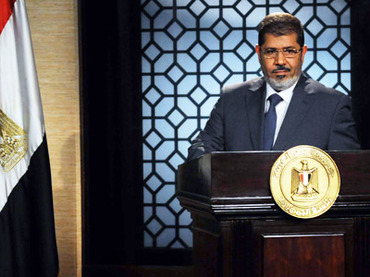
President-elect Mohamed Morsi has already moved into one of ousted President Hosni Mubarak’s offices and has started talks over the appointment of his vice presidents, presidential team, prime minister and cabinet.
Morsi has several key decisions and appointments to make over the coming few days. He is set to assume power from the ruling Supreme Council of Armed Forces next Saturday, June 30. The former Muslim Brotherhood member and Freedom and Justice Party Chairmen has met with SCAF Chairman Field Marshal Hussein Tantawi, and Prime Minister Kamal El-Ganzouri yesterday to discuss the state of the country and his plans for his new government.
SCAF had issued a constitutional decree limiting the president’s powers only days before Morsi’s victory. The decision came after it dissolved the Islamist-dominated People’s Assembly, parliament’s lower house.
In the decree, SCAF gave itself legislative authority to act as the People’s Asssembly until the election of a new one, as well as control over all military related affairs. It also gave itself authority to form the Constituent Assembly tasked with writing the new constitution and veto powers over the Assembly’s decisions.
In attempt to pressure SCAF into reversing this set of decisions Morsi allied himself with several revolutionary groups and figures that do not necessarily support either him or the Brotherhood, but rather oppose SCAF.
To maintain this uneasy alliance, Morsi promised to form an inclusive government with a diverse ‘presidential team’ of three vice presidents: a Coptic Christian, a woman and either one of the former presidential candidates representing the revolution or someone they recommend; as well as aides and advisers, all from outside the Muslim Brotherhood and its political arm the FJP.
Morsi has reportedly offered both former presidential candidates Abdel Moniem Aboul Fotouh and Hamdeen Sabahi the position of vice president but both turned the position down.
Aboul Fotouh has recommended Abul Ela Madi, Chairman of the moderate Islamist Wasat Party, instead while Sabahi has suggested either independent constitutional expert Hossam Eissa or former Karama Party MP Amin Iskandar.
Morsi also promised to appoint an independent and ‘patriotic’ figure accepted by all political forces to the post of Prime Minister and to form a national unity coalition cabinet.
Sabahi and Aboul Fotouh have both nominated Nobel laureate and Dostour Party founder Mohamed ElBaradei for the post with Ziad Bahaa El-Din, former parliamentary bloc leader of the Egyptian Social Democratic Party as a backup option.
ElBaradei has repeatedly said he does not wish to assume any official positions ever since he pulled out of the presidential race last January and has reportedly refused Morsi’s offer several times. He remains, however, the favoured choice for all political forces and groups and may yet be persuaded.
Officials from Morsi’s campaign have said that if ElBaradei were to accept the prime minister position, the cabinet would only include two ministers from the FJP and one from the Salafist Nour Party with the rest of the cabinet positions being given to technocratic, independent figures.
The Brotherhood wants the Industry and Foreign Trade Ministry and the Supply and Social Affairs Ministry in order to solve the gas and petrol crises as well as reduce prices of food and goods so that Egyptians would feel an increase in their quality of life with the coming of Morsi.
The Nour Party will ask for one of the service ministries such as Education, Health, Local Development or Communications according to its official spokesperson, Yosri Hammad.
In yesterday’s meeting with Tantawi and El-Ganzouri, Morsi listened to El-Ganzouri’s report on the economic and security situation.
As per tradition when a new president is elected, El-Ganzouri’s cabinet resigned, although they tendered their resignation to SCAF not Morsi. Tantawi has asked El-Ganzouri to remain in his post in a caretaker capacity until Morsi appoints his own cabinet.
It is understood that SCAF intends to pick both the Interior and Foreign Ministers in the next cabinet but it is unknown if that will happen through a deal with Morsi or despite his objections.
Brotherhood officials Mohamed Badei, the Supreme Guide, and his Deputy Khairat El-Shater have met SCAF before the election results were announced and reportedly agreed that SCAF would only dissolve a third of PA seats rather than the whole assembly in exchange for the Brotherhood’s forming of a coalition cabinet and not taking of the four “sovereign ministries” of Interior, Foreign Affairs, Defence and Justice.
In any case, the Brotherhood wishes to distance itself from all “sovereign” ministries, especially the Ministry of Interior, so that it would not find itself in conflict with revolutionaries if they take to streets.
The new cabinet will not have a Defence Minister since the supplementary constitutional decree gives SCAF and its head the powers of the Defence Minister and military General Commander and does not allow the president to make personal changes within SCAF.
Furthermore, with SCAF also holding legislative power as acting-PA, its members cannot have executive positions.

